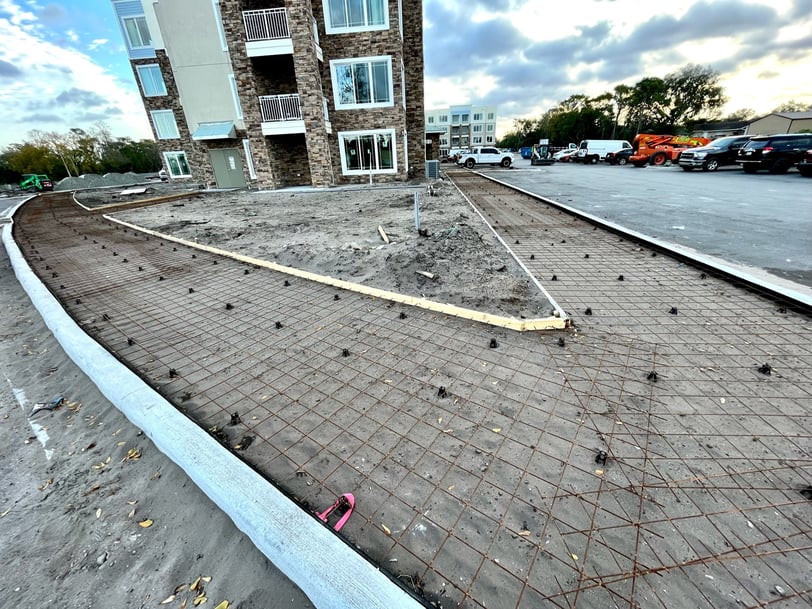CALL US TODAY! → (321) 202-7780
The Importance of a Strong Foundation: Ensuring Longevity in Construction
Learn what makes a concrete foundation strong, long-lasting, and code-compliant. Perfect for new builds and additions. Discover tips and insights from the pros.
4/10/20255 min read


Understanding Foundation Types
When it comes to construction, the choice of foundation is critical to ensuring the stability and longevity of a structure. There are three primary types of foundations commonly utilized: slab, crawl space, and basement foundations. Each type carries its own advantages and disadvantages, and the suitability of a particular foundation often depends on factors such as soil type, climate, and the overall design of the building.
A slab foundation is laid directly on the ground, typically using reinforced concrete. This type is relatively cost-effective and requires less excavation, making it ideal for warmer climates where the ground does not freeze. However, it can be problematic in areas with poor drainage, as moisture can accumulate underneath the slab, potentially leading to structural issues over time.
Crawl space foundations elevate a structure above the ground, creating a space between the ground and the home. This type allows for easier access to plumbing and electrical systems, making repairs and renovations simpler. Furthermore, crawl spaces can help mitigate moisture problems when properly ventilated. Nevertheless, this foundation type may require additional pest control measures and insulation efforts to ensure energy efficiency.
Lastly, basement foundations provide additional living or storage space while offering exceptional structural support. This type can be advantageous in regions where snowfall or heavy rains are common, as a basement's below-ground nature can help with temperature regulation and protect against moisture. However, constructing basement foundations can be more expensive and complicated due to excavation and waterproofing challenges.
Ultimately, the foundation type selected plays a crucial role in the stability of a structure. Understanding the pros and cons of slab, crawl space, and basement foundations will empower builders and homeowners to make informed decisions tailored to their specific environmental conditions and construction needs.
The Quality of a Pour: What Defines a Durable Foundation
A durable foundation is pivotal to the longevity and stability of a structure. Achieving a high-quality concrete pour requires meticulous attention to various elements that contribute to the overall strength and resilience of the foundation. The process begins with proper soil preparation, which lays the groundwork for a robust foundation. The soil must be tested and compacted to ensure it can adequately support the weight of the building. Poorly prepared soil can lead to settling and shifting, both of which compromise the integrity of the foundation.
The next critical aspect is the concrete mix design. A well-balanced mix will have the appropriate proportions of cement, aggregates, and water, which directly influences its strength and durability. Utilizing admixtures can further enhance specific properties of the concrete, such as its workability and resistance to weathering. Adhering to industry standards for the mix ensures that the concrete pour meets structural requirements and will withstand environmental stressors.
Reinforcement methods are also essential in creating a durable foundation. Steel reinforcements, such as rebar or wire mesh, provide additional tensile strength, helping the foundation to withstand loads and resist cracking. Proper placement and spacing of these reinforcements are crucial for optimal performance. During the pouring process, adhering to best practices is paramount. This includes managing the pour to avoid cold joints and ensuring continuity in the concrete placement. Employing professional techniques can significantly minimize common foundation issues, such as cracks or shifts over time.
Lastly, compliance with building codes and regulations cannot be overlooked. These codes are established to ensure safety and reliability, and adhering to them is fundamental to constructing a lasting foundation. In conclusion, the quality of a concrete pour hinges on diligent preparation, appropriate mix design, effective reinforcement strategies, and strict adherence to regulatory standards, all of which serve to prevent future foundation problems.
Protecting Your Investment: The Role of a Strong Foundation
A well-constructed foundation serves as the bedrock of any property, whether residential or commercial, and is essential for safeguarding your investment over time. One of the primary benefits of a strong foundation is its ability to protect against environmental challenges, such as soil movement, earthquakes, and flooding. Properties built on unstable or inadequate foundations are susceptible to structural damage, which often results in costly repairs and diminished property value. For instance, a case study involving homes in earthquake-prone areas demonstrates that those with reinforced foundations suffered markedly less damage during seismic events compared to those without such measures in place.
In addition to protecting against natural disasters, a robust foundation can significantly reduce maintenance costs. Properties suffering from foundation-related issues, such as cracks or settling, often require extensive and ongoing repairs. These costs can accumulate over time, leading homeowners and commercial property owners to spend large amounts on maintenance and remediation. For example, buildings that were designed with deep pilings and proper drainage systems experienced fewer issues related to water intrusion and structural instability, leading to a decreased need for repairs. This proactive approach not only saves money but also ensures a safer living or working environment.
Moreover, a strong foundation directly contributes to the overall property value. Real estate appraisers take into account the quality of a property’s foundation when determining its market worth. Properties with well-engineered foundations are more appealing to buyers and investors, as they indicate durability and reliability. It is common for properties with certified foundation inspections to command higher prices in the market. In summary, understanding the role of a strong foundation in construction is vital for protecting your investment, minimizing future expenditures, and ensuring the long-term value of your property.
Planning Your Foundation Project with Ramos Elite Construction Corp
When embarking on a foundation project, the importance of careful planning cannot be overstated. Engaging with Ramos Elite Construction Corp provides a structured approach, ensuring that each step is executed with precision and expertise. The process begins with an initial consultation, during which clients are encouraged to discuss their specific needs, site conditions, and any concerns they may have regarding the foundation work. This dialogue lays the groundwork for a comprehensive strategy tailored to the project's unique requirements.
Ramos Elite Construction Corp prides itself on its commitment to code compliance and quality assurance. Throughout the planning phase, the company conducts thorough site assessments, evaluating soil conditions and drainage requirements that are critical to the foundation's longevity. This meticulous approach helps to identify potential issues early, allowing for adjustments to be made before construction begins. Clients are kept informed and involved in the decision-making process, fostering a collaborative environment that ensures their vision is realized.
After the planning phase, the next steps involve obtaining the necessary permits and approvals. Ramos Elite Construction Corp navigates the regulatory landscape with expertise, ensuring that all specifications meet local building codes. This not only streamlines the construction process but also guarantees that the foundation is built to last, withstanding the test of time.
For homeowners and business owners selecting a contractor, it is essential to evaluate their experience and track record in foundation projects. Asking for references and reviewing past work can provide insight into a contractor's capabilities. Additionally, verifying their familiarity with local codes can prevent potential compliance issues. With Ramos Elite Construction Corp, clients can trust that their foundation project will be executed with competence and care, ultimately ensuring a solid foundation for years to come.
FOLLOW US ON SOCIAL MEDIA
SUBSCRIBE TO OUR NEWSLETTER
CALL:
HOURS:
Mon-Sat
7:00am-5:00pm
COPYRIGHT © 2025 RAMOS ELITE CONSTRUCTION CORP


